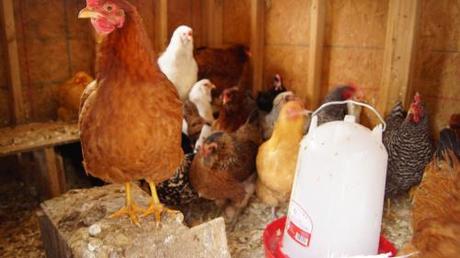
Boy this has been a tough winter. I’m hearing accounts from all over New England of people who are losing chickens.
In the winter, it’s common to lose some of the older or not quite as strong members of your flock. Last winter we lost 3 birds. They were alive and well one day, frozen solid the next. It’s a way for nature to ensure that the most fit will survive.
It happens, but you don’t have to like it.
As of yesterday, we haven’t lost any of our flock to the winter weather, but with continued snow and record low temperatures in the forecast, I fear, it’s only a matter of time. We do what we can for the flock and hope against hope (and Mother Nature) that we will all come out on the other side intact.
Some things you can do for your flock in the extreme cold:
If you notice black spots or white, cracked edges on your chickens’ combs, it is because the tissue has become frostbitten. Depending on the severity, you may or may not want to treat the bird.
There are ointments (similar to Bag Balm) that you can apply to the combs. A few precautions, however:
To apply the balm, you need to catch the chickens, be careful in the ice and snow, the chickens (and you) could slip and get hurt.
You’ll need to gently rub the balm on the comb. Even if you rub with care, you still run the risk of damaging tissue. NEVER remove a dried off area of the comb. While it’s attached, it protects the tissue underneath – much like a scab protects your healing skin, eventually the dried tissue will fall off on its own.
Unless, there is a large amount of frostbite damage, I don’t treat my birds, but then I don’t show them (which would mean that frostbite may detract from the look) it’s a personal decision. I love my birds warts and all.
DO NOT think that by supplying heat to the hen house you are helping your chickens with staying warm or frostbite. I’ve talked about this before. Heat does not belong in a coop. Heaters start fires and heaters create moisture which can actually make matters worse.
Best thing you can do? If tissue is damaged, it needs to heal. Make sure your chickens have a good supply of nutritious food. Give them plenty of feed, but also be sure to send out your kitchen scraps, and of course, make sure they have access to water.
I’ve talked about suet so often this winter that I want to give you a precaution. Suet is something that should be given to your flock on an occasional basis. During the worst of it, I usually give my flock of 27 two suet blocks every other week.
You DO NOT want to give your flock too much suet as, just like any other high calorie food, it can lead to obesity and other health problems.
Lastly, here’s something I’ll bet you didn’t know:
Here’s a little tidbit from Raising Chickens for Dummies: Roosters with frostbitten combs may be temporarily infertile. But it’s not the frostbite that causes the infertility; it’s the amount of cold that the chicken has been exposed to. Usually fertility is restored after conditions improve and the rooster’s body recovers from the stress.
***
Wendy Thomas writes about the lessons learned while raising children and chickens in New Hampshire. Contact her at [email protected]
Also, join me on Facebook to find out more about the flock (children and chickens) and see some pretty funny chicken jokes, photos of tiny houses, and even a recipe or two.
Like what you read here? Consider subscribing to this blog so that you’ll never miss a post. And feel free to share with those who may need a little chicken love.

